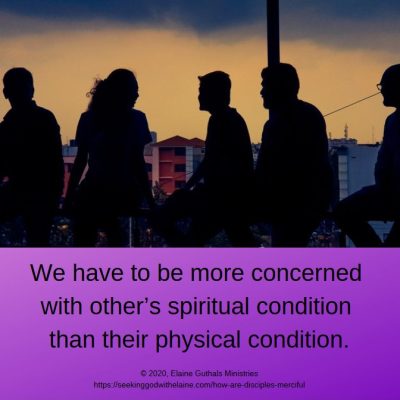Mercy has been defined by some as compassion. However, biblical mercy goes beyond that. This devotion looks at biblical mercy through the lens of growing to imitate God.
Nuggets
- Mercy is more than forgiveness and kindness and goes beyond sorrow at other’s suffering.
- We have to be more concerned with other’s spiritual condition than their physical condition.
- Mercy isn’t just following the law.
- When we give mercy to others, we get mercy.
Devotions in the The Beatitudes Show Us How to be Docile series

Some people think being merciful is being kind and compassionate. However, it is more than that. Let’s take a look.
Let's Put It into Context
We are talking in this series about how disciples are to be docile. Docile means easily taught. As we grow in our relationship with God, we are blessed.
Blessedness means we have been perfected. For the disciple, perfection is holy, sanctified, and righteous.
Holy means to be set apart, perfect, and pure. Sanctification is the process where our lives are changed, and we made holy. Righteousness is the result of a solid relationship with God. Blackall said that righteousness is “living a life in sincere and perfect obedience to all the laws of God.”
Mercy is defined as “a personal characteristic of care for the needs of others. The biblical concept of mercy always involves help to those who are in need or distress” (Holman Bible Dictionary).
We haven’t really had a devotion where we have focused specifically on mercy. The closest we have come is God’s Wrath and Mercy. We said that sin, which leads to wrath, is the polar opposite of the Spirit — with which we are supposed to be filled. Sovereign God gets to decide crimes and punishments. There is hope for us because God is rich in mercy (Eph. 2: 4). Mercy comes out of God’s love, which is His character (I Jn. 4: 8).
What Is a Merciful?
“Blessed are the merciful …” (Mt. 5: 7 CSB)
Jordan wrote that examples of mercy are the following:
- “In the forgiveness of enemies.
- “In various acts of kindness.
- “In deep concern and effort for the spread of the gospel.”
Given those examples, it may be easy for some to limit mercy to the first two — closer to the world’s definition of compassion.
To me, the world’s definition of mercy — or rather, compassion — is “… sorrow at the suffering of a fellow-creature, rational or irrational, and, along with that sorrow, an earnest desire, if possible, to relieve it.”
Don’t get me wrong. That is how disciples are to act.
But it is more than just Jordan’s first two points and goes beyond Cumming’s definition.
Disciples are not to stop at “are they suffering” as Cumming suggests. We are to transition into questioning “are they a believer.” We have to be more concerned with other’s spiritual condition than their physical condition.

Brooke made an excellent point. Mercy isn’t just following the law. “It is a temper which makes him who has it not so much sorry that he has been injured, but sorry that the injurer should have the heart to do the wrong. All memory of wrong fades from him.”
It isn’t just about doing the do’s and not doing the don’ts. It is about changing our character to be more Christ. It is continuing to move forward on the sanctification road to reach the destination of righteousness.
Ooo, baby. Worldview people are not going to like what Blackall had to say. He said that disciples show mercy to others “to prevent any evil or mischief which we apprehend our neighbour to be in.” To them, that would probably come across as sticking our noses into their business to force them to be like us.
Yes, God loves us and cares for us on this earth. The life in this world will never be His priority. God’s priority will always be His kingdom and our spiritual condition.
So, what does this tell us? It is not the random acts of kindness in and of itself. It is our character. But the character has to imitate God and want to further His kingdom.
More Mercy
“… for they will be shown mercy” (Mt. 5: 7 CSB)
This is one of those instances where you get what you give. When we give mercy to others, we get mercy.
Jordan wrote, “A merciful Providence will attend the merciful Christian.” Providence means “God’s faithful and effective care and guidance of everything which He has made toward the end which He has chosen.”
So, let’s put the definitions together. God’s faithful and effective care and guidance will be present with those who care for the physical and spiritual needs of others.
Most importantly, God will show us this care and guidance to us for eternity.
Brooke cautioned us that we should not be be merciful just to reap the rewards. We need to be merciful because that is a characteristic of God.
Making the Connections
I think the bottom line with mercy is humility. If we don’t perform whatever act of mercy in humility, it really isn’t mercy.
The definition just talks about others. It doesn’t talk about who we feel doing the act or what we gain from it. The focus is on others.
We said in that disciples are humble because we know we have sinned and fall short of God’s glory (Rom. 3: 23). We need to submit to His Will.
We need to witness so that others come to know Jesus as their personal Savior too. I’ll say it again. God’s priority will always be His kingdom and our spiritual condition. It will always be about restoring the relationship with us and growing us to where we need to be — righteous.
Making the Connections to Self-Discipline
Jordan made the comment that, “the more you abound in mercy, the more you are conformed to the precepts of the Scriptures.” So, what are those intended behaviors that will be rewarded with mercy?
- “With the merciful you show yourself merciful; with the blameless man you show yourself blameless” (Ps. 18: 25 ESV).
- “Mercy and truth have met together; Righteousness and peace have kissed” (Ps. 85: 10 NKJV).
- “Let not mercy and truth forsake you; Bind them around your neck, Write them on the tablet of your heart, And so find favor and high esteem In the sight of God and man”(Prov. 3: 3-4 NKJV).
- “The merciful man does himself good, But the cruel man does himself harm “ (Prov. 11: 17 NASB).
- “He who despises his neighbor sins; But he who has mercy on the poor, happy is he. Do they not go astray who devise evil? But mercy and truth belong to those who devise good” (Prov. 14:21- 22 NKJV).
- “He who follows righteousness and mercy Finds life, righteousness, and honor” (Prov. 21: 21 NKJV).
- “No, O people, the LORD has told you what is good, and this is what he requires of you: to do what is right, to love mercy, and to walk humbly with your God” (Mic. 6: 8 NLT).
- “Be merciful just as your Father is merciful” (Lk. 6: 36 GNT).
- “Since God chose you to be the holy people he loves, you must clothe yourselves with tenderhearted mercy, kindness, humility, gentleness, and patience. Make allowance for each other’s faults, and forgive anyone who offends you. Remember, the Lord forgave you, so you must forgive others” (Col. 3: 12-13 NLT).
Many of the translations have watered down mercy to kindness, help, or even love. They take the concept of the unexpected way God responds in love to our needs.
Is that critical? Look how Jesus bit on the Pharisees. “Woe to you, teachers of the law and Pharisees, you hypocrites! You give a tenth of your spices — mint, dill and cumin. But you have neglected the more important matters of the law — justice, mercy and faithfulness. You should have practiced the latter, without neglecting the former” (Mt. 23: 23 NIV).
How does that apply to self-discipline? This is how we are to grow to become more like God.
How Do We Apply This?
If we look at Blackall’s sermon, we can come up with this list of how we could apply this.
- Don’t be cruel.
- Exercise moderation.
- Love our neighbor as ourselves.
- Watch out for our neighbors.
- Witness to our neighbors.
- Be there for others when they are going through trials.
- Be the Matthew 25: 35-36 blessed people.
Yes, many worldview people are kind, compassionate people. God is so much more than that. He calls us to be more, too.
Loving God. We know You are more — more loving, more compassionate, more merciful. You call us to be more, too. You call us to different from the world and more like You. Help us to build our characters to imitate You. Amen.
What do you think?
Leave me a comment below (about this or anything else) or head over to my Facebook group for some interactive discussion.
If you don’t understand something and would like further clarification, please contact me.
If you have not signed up for the email daily or weekly providing the link to the devotions and the newsletter, do so below.
If God has used this devotion to speak with you, consider sharing it on social media.
Pingback: How Are Disciples Peacemakers? – Seeking God with Elaine
Pingback: How Do Disciples Mourn? – Seeking God with Elaine
Pingback: Why Should We Love Our Enemies? – Seeking God with Elaine